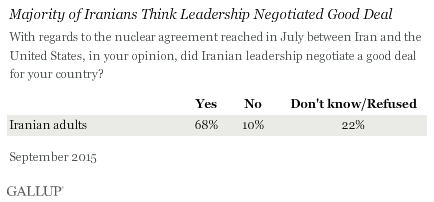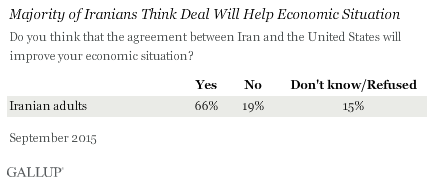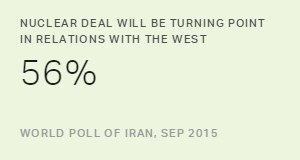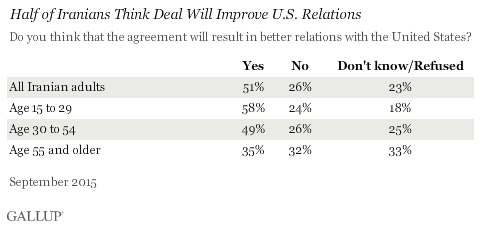Story Highlights
- 68% of Iranians say Iran's leadership negotiated a good deal
- 66% say deal will help their personal economic situations
- 51% think relations will improve with U.S.
WASHINGTON, D.C. -- Although tensions are mounting between Iran's president and hard-liners over their country's future after the nuclear deal with the U.S. and five other world powers, the majority of Iranians expect good things to come from the landmark agreement. More than two in three Iranians (68%) polled in September -- soon after the deal was reached -- think that Iran's leadership negotiated a good deal for their country.

The agreement, approved last month by Iran's highest legislative authority and sanctioned by its Supreme Leader Ayatollah Ali Khamenei, will ultimately give Iran relief from years of economic sanctions in exchange for limiting its nuclear activities. With most Iranians in late 2014 saying the sanctions were hurting their livelihoods, it is not surprising that many Iranians' personal hopes are pinned to the deal. Two in three Iranians (66%) expect the deal to improve their personal economic situations; 19% do not share this enthusiasm.

On the heels of the nuclear agreement, Iranians' outlook for their national economy in general remains cautious. Iranians are equally divided between those who think their economy is getting better (42%) and those who think it is getting worse (41%). The glimmer of hope among Iranians that their economy was getting better emerged almost a year ago after limited easing of sanctions, but Iranians today remain in a wait-and-see mode.

Majority of Iranians See Deal as Turning Point in Relations With the West
Many Iranians are also hopeful that the deal will lead to better relations with the West and the country's long-time nemesis, the U.S. A majority (56%) think the agreement will mark a turning point in relations with the West, and about half (51%) feel it will result in better relations with the U.S. Young Iranians in particular are the most optimistic about relations with the U.S.

This is not to say that mistrust of the U.S. is not still very much alive in Iran. On Nov. 4, the 36th anniversary of the U.S. embassy seizure during the country's Islamic revolution, demonstrators in the country's capital reportedly burned U.S. flags. Iranians' approval of U.S. leadership improved only minimally after the nuclear deal. Fewer than one in five (19%) Iranians in 2015 approve of U.S. leadership, which is only slightly higher than the 13% to 15% between 2012 and 2014, when the public chiefly blamed the U.S. for sanctions.
Still, there is widespread hope for better relations with the U.S. even among Iranians who disapprove of U.S. leadership, with nearly half (47%) believing the nuclear deal will result in improved relations between the two countries.
For many Iranians, those hopes are likely contingent on how the deal is implemented. Most remain uncertain that the U.S. will live up to its obligations toward the nuclear agreement. A mere 5% are very confident the U.S. will satisfy its obligations under the agreement, while 40% are somewhat confident, 18% are not very confident and 23% are not at all confident.
Implications
Iranians firmly believe that their leadership has negotiated a nuclear deal that is good for their country. Feeling the economic pinch they have been in, Iranians see a light at the end of the sanctions tunnel. Iranians anticipate economic benefits and better relations with the U.S., but they are skeptical that the U.S. will fully honor the agreement. Americans, too, are concerned about Iran, with just 11% viewing Iran favorably amid nuclear deal negotiations earlier this year. With high expectations, but little trust, there is significant pressure on both Iran and the U.S. to hold up their respective ends of the bargain.
Survey Methods
Results are based on face-to-face interviews with 1,001 adults in Iran, aged 15 and older, conducted September 2015. For results based on the total sample, the margin of sampling error is ±3.9 percentage points at the 95% confidence level. Surveys in other years were conducted with approximately 1,000 adults and the margin of sampling error was typically between ±2.4 and ±4.0 percentage points. All reported margins of sampling error include computed design effects for weighting.
For more complete methodology and specific survey dates, please review Gallup's Country Data Set details.
Learn more about how the Gallup World Poll works.
